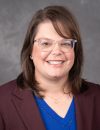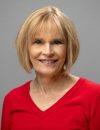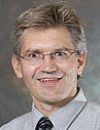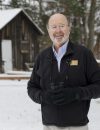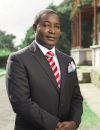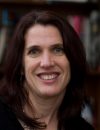The assignment for a group of UW-Madison students: Find a way for this two-legged dog to walk more easily.
UW In The News
-
Autism’s genetic drivers may differ by sex
Quoted: The findings support the idea that women can sustain a larger genetic hit than men without having autism, a phenomenon called the ‘female protective effect,’ says Donna Werling, assistant professor of genetics at the University of Wisconsin-Madison, who was not involved in the work. But the mechanisms that might protect women are a mystery.
-
What U.S. State Population Changes Mean for American Elections
Quoted: Professor Barry C. Burden, director of the Elections Research Center at the University of Wisconsin-Madison, told Newsweek the changes will not be large but probably give Republicans a “slight boost.”
-
Lynda Barry’s Making Comics is a “cookbook” for people afraid to draw
But it’s Beuys’s quote that comes to mind when reading Making Comics, the latest handwritten college textbook-of-sorts by the highly successful cartoonist Lynda Barry. In the book, Barry makes a similar assertion to Beuys by using the experience and anecdotes she’s accumulated during her tenure as a professor of comic book studies at the University of Wisconsin, Madison.
-
The Gene Drive Dilemma: We Can Alter Entire Species, But Should We?
Qutoed: LAs Alta Charo, a professor of law and bioethics at the University of Wisconsin, Madison, says of our genetic-engineering capability, “At a very instinctive level, there’s a sense that these are things humans are not supposed to be doing.”
Quoted: Playing to fears around worst-case scenarios can be a powerful tactic. Dietram Scheufele, who studies scientific and political communication at the University of Wisconsin, Madison, says that scientists are generally much worse than activist groups at shaping public opinion, in part because they tend to rely on logical reasoning and facts, while activist groups are more likely to tap into unconscious values and emotions — like using the term “Frankenfoods” to describe G.M.O.s.
-
Why We Need Real Food & Real Jobs In American Public Schools
Guests: Jennifer E. Gaddis, assistant professor of Civil Society and Community Studies at the University of Wisconsin-Madison & author of The Labor of Lunch: Why We Need Real Food and Real Jobs in American Public Schools
-
Wisconsin Loses 10 Percent Of State’s Dairy Herds As Fallout From Low Milk Prices Continues
Mark Stephenson, director of dairy policy analysis for the University of Wisconsin-Madison, said Wisconsin usually sees a 4 percent decline in herd numbers each year. But the prolonged period of low milk prices from 2014 to 2019 have forced many farms to sell their herds.
-
Climate change is playing havoc with Mexico’s monarch butterfly migration
Quoted: “The question we’re asking is ‘Can one of the world’s most adaptive insects adapt to climate change?’” asked Karen Oberhauser, who studies the species at the University of Wisconsin. “We are changing the conditions and just waiting to see.”
-
From service to science: NIH shifts focus of mentoring network aimed at boosting grantee diversity
Quoted: “A growing body of evidence exists about how to create and sustain successful and inclusive mentoring relationships,” says Angela Byars-Winston, a professor of medicine at the University of Wisconsin (UW), Madison, and chair of the committee that wrote the report. “We hope our report can catalyze [the] use of that evidence.”
-
How do you make walking easier for a 2-legged dog? Ask UW-Madison engineers for help
-
How to forgive someone who has hurt you—and why you should
Robert Enright, a professor of psychology at the University of Wisconsin-Madison School of Education who has studied forgiveness extensively, says he understands the concern. But he feels the issue is actually a semantic one.
-
Cartoonist and ‘Genius Grant’ recipient Lynda Barry on the scariness of creativity
“When kids draw,” Lynda Barry says, “there’s almost always a story that comes with their drawing.” That childlike Eden, where words and pictures arrive in tandem, is a place that the cartoonist and associate professor at the University of Wisconsin-Madison is constantly trying to rediscover.
-
Heavy road salt use a growing problem, scientists say
Quoted: Given the amount of salt used on roads, that’s a real problem, according to Hilary Dugan, a professor of integrative biology at the University of Wisconsin-Madison. A 2017 study by her team found that nearly half of the 284 freshwater lakes in their sample in the Northeast and Midwest had undergone “long-term salinization.” One in 10 of them reached a threshold where scientists worry about impacts on aquatic life.
-
Fathers should be screened for postpartum blues, too
Quoted: “Depression among new dads is a problem that too often gets overlooked,” lead author Tova Walsh, an assistant professor of social work at the University of Wisconsin-Madison, told Reuters Health.
-
Wisconsin’s Voting Battles Could Be Pivotal To 2020 Election : NPR
Quoted:A judge in Wisconsin has ordered the names of more than 200,000 people removed from voter rolls. The outcome could make a difference to President Trump’s reelection effort. Featuring: Barry Burden
-
5G Cell Service Will Screw Up Weather Forecasts
Quoted: “It’s just physics,” meteorologist Jordan Gerth of the University of Wisconsin, Madison, told BuzzFeed News. “You can’t just tell water molecules to change the channel, or use another frequency.”
-
Artificial Intelligence Is Rushing Into Patient Care – And Could Raise Risks
Quoted: AI systems that learn to recognize patterns in data are often described as “black boxes” because even their developers don’t know how they have reached their conclusions. Given that AI is so new and many of its risks unknown the field needs careful oversight, said Pilar Ossorio, a professor of law and bioethics at the University of Wisconsin-Madison.
-
Wisconsin Corn, Soybean Crops Harvested At One Of the Slowest Paces On Record In 2019
Joe Lauer, agronomy professor at the University of Wisconsin-Madison, said this year was just behind the slowest harvest pace in 1992.
-
This is what it’s like waking up during surgery
Quoted: General anesthesia, in contrast, aims to do just that, creating an unresponsive drug-induced coma or controlled unconsciousness that is deeper and more detached from reality even than sleep, with no memories of any events during that period. As Robert Sanders, an anesthetist at the University of Wisconsin–Madison, puts it: “We’ve apparently ablated this period of time from that person’s experience.”
-
Federal Government Approves 10 New Pesticides For Hemp Farming
Shelby Ellison, a hemp researcher at the University of Wisconsin-Madison, said the new approvals will add another helpful tool to farmers’ toolboxes.
-
‘Stunning piece of propaganda’: Journalists blast One America News series
Quoted: “I think this completely crosses a line,” said professor Kathleen Culver, director for journalism ethics at the University of Wisconsin-Madison’s School of Journalism and Mass Communication.
-
Economy Looms Large in 2020 Election Battle for Wisconsin
Quoted: “We’ve actually run into a bit of a bottleneck in the sense that we don’t have enough people to fill the jobs that we have,” said Steven Deller, economics professor at the University of Wisconsin, Madison, who says economic strength is good news for President Donald Trump’s re-election efforts in the state.
-
First human ancestors to leave Africa died out in Java, scientists say
Quoted:But John Hawks, an anthropologist at the University of Wisconsin-Madison, raised doubts about the identity of the fossils. “The question I’m asking is why should we think that these fossils are Homo erectus?” he said. “It’s hard for me to see a population of fossils from Java 120,000 years ago and not assume they were probably Denisovan.”
-
Researchers Find High Levels of PFAS Chemicals in Rainwater in United States
Martin Shafer, principal researcher with the National Atmospheric Deposition Program at the University of Wisconsin-Madison, told the Guardian, “There were folks not too long ago who felt the atmospheric transport route was not too important. The data belies that statement.”
-
Look, Lisa, it’s Lin-Manuel Miranda!
In her speech at the University of Wisconsin-Madison’s Winter Commencement ceremony, Lisa referenced Hamilton – an award-winning Broadway musical written and composed by Miranda.
-
The workout drug
Researchers are still working out what matters in this complex arena. Exercises that involve more muscle groups generate more IL-6, so full-body exercises like running have a greater anti-inflammatory effect than exercises that target just a few muscle groups, says Pedersen. And the benefits go away within a couple of days, suggesting that exercising frequently is important. “If it’s been 48 hours since you exercised, it’s time to do it again,” says Jill Barnes, an exercise physiologist at the University of Wisconsin–Madison.
-
Can Diesel Finally Come Clean?
Quoted: “Sandia’s DFI technology is on the cutting edge of new ideas,” says leading diesel expert Rolf Reitz, former director of the Engine Research Center at the University of Wisconsin–Madison. “It represents an alternative to natural mixing phenomena in diesel combustion.”
-
Autism prevalence estimates for Catalonia, Iran highlight gaps in data
“A weakness of the [Catalonia] study is lack of information on co-occurring conditions such as intellectual disability, and information about sociodemographic variables,” says Maureen Durkin, professor of population health sciences and pediatrics at the University of Wisconsin-Madison, who was not involved in either study
-
Rightwing group pushes Wisconsin voter purge that ‘could tip’ 2020 election
Quoted: “It’s over 200,000 voters who are affected. If even a small slice of them were deterred from voting in 2020, it could tip the outcome,” said Barry Burden, a political science professor at the University of Wisconsin-Madison and director of its Elections Research Center. He added the people affected would be young people and those who live in cities – groups that tend to vote Democratic.
-
Smart toilet: Technology could check urine to detect diseases early
That’s the thinking of two scientists at the University of Wisconsin-Madison, Joshua Coon and Ian Miller, who believe a “smart toilet,” can become a tool to closely monitor your health, and eventually learn more about the early molecular signs of diseases like cancer and diabetes.
-
Retailers hope to cash in on the year’s final weekends
Quoted: “Typically, the Saturday before Christmas is very close to Black Friday in sales,” said Executive Director of the Kohl’s Center for Retail at UW-Madison, Jerry O’Brien. “There’s a lot of people [where] it’s actually part of their tradition, you go out just before the holiday and buy the stuff.”
O’Brien says one of the advantages of having a mid-week Christmas is the potential many workers might either start their holiday next weekend, or begin a long weekend at the start of Christmas.
“Additionally, it’s the time where people are taking their returns in, and they have gift cards, so there’s a lot of traffic in the stores and there’ll still be some really great deals out there,” he said.
- Newer stories
- Page 66 of 140
- Older stories
Featured Experts
Noelle LoConte: Pancreatic Cancer Awareness Month
Pancreatic cancer is one of the most difficult cancers to prevent, diagnose or treat. Earlier this month, music legend Quincy… More
Kathleen Glass: Food safety
Food is an integral part of Thanksgiving. And who doesn't love leftovers? But after how long should you leave those… More
Cecelia Klingele: Body-worn cameras by police
Madison Police Chief Shon Barnes is requesting that the city fund widespread use of body cameras for officers in the… More
Jonathan Temte: The seasonal flu shot
Family medicine professor Jonathan Temte is available to discuss this year's updated seasonal flu shot and flu prevention and control. More
Stanley Temple: Fall phenology
The days have finally started getting cooler and we all know winter awaits. Stanley Temple, an expert on birds, wildlife, endangered… More
Alvin Thomas: Movember and Men's Health Month
You might see more facial hair this month as Movember goes into full effect, drawing awareness toward men's health. Alvin… More
Dominique Brossard: Vaccine hesitancy
With a new administration poised to take power in January, a change in policy regarding vaccines may also be on the way.… More

